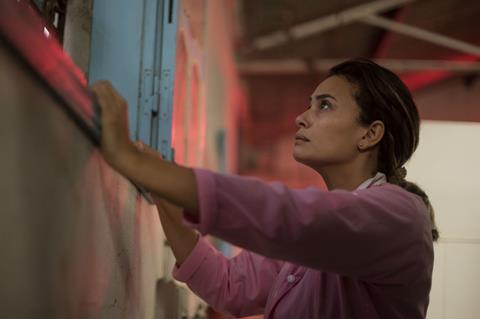In working-class Tunis, little has changed for women in Hinde Boujemaa’s fiction debut

Dir/scr. Hinde Boujemaa. Tunisia, Belgium, France, Qatar. 2019. 92 mins.
After her 2012 documentary It Was Better Tomorrow, which cast a skeptical eye on the extent to which Tunisia’s Jasmine Revolution changed anything at all for the country’s underclass, Hinde Boujemaa crafts an uneven but ultimately potent women’s drama with her fictional debut. Featuring an intense performance by feted Tunisian actress Hend Sabri, Noura’s Dream inhabits a working-class Tunis where large families cram into small rented rooms in crumbling colonial-era buildings, an environment of hard graft and petty crime abetted by corrupt police officers, where the progressive attitudes espoused by the country’s elite have little traction.
Hend Sabri is excellent at conveying a mixture of fear and resilience, hope and jaded realism
Although it’s soaked in the diesel, dust and traffic noise of its urban setting, Noura’s Dream could, with a few tweaks, be set anywhere where a woman’s dreams can be destroyed by a combination of male coercion and institutional connivance, and in plenty of different periods too. This may, paradoxically, dilute its urgency for distributors and arthouse audiences even while it makes the film’s themes more universal. But there’s still enough engaging drama and rich cinematic texture here to open up a few doors.
The film’s French title, Noura reve (literally ‘Noura dreams’) works better than its English translation ’Noura’s Dream’ as a description of what the film is about – an idyll that can never come true. That idyll is there for a few seconds when hospital laundress Noura (Sabri) meets her car mechanic lover Lassad (Boumsaoudi) in the entrance hall of a lawyer’s office: in the sudden silence as the door slams and shuts out the street, the two lock in a still embrace, inhaling each other’s scent. But it’s soon interrupted, and the lovers hurriedly detach to discuss with a disapproving lawyer the details of the divorce Noura is trying to secure from Jamel (Abdelli), her jailed husband. After asking her whether she’s thought of her three children, the female lawyer reminds her that adultery, in Tunisia, carries a five-year prison sentence.
When the hot-headed, none-too-bright Jamel is unexpectedly released from jail thanks to a presidential pardon, Noura is forced to play the submissive wife to a man who disgusts and frightens her in order to protect the couple’s three school-age kids. It’s here that the film reaches its dramatic peaks, as the shaven-headed Jamel, all coiled-up threat and menacing tenderness, circles this anxious woman who is playing desperately for time, sniffing out her secret with animal instinct. The camera lingers on Noura’s careworn face as her options close down and the family apartment – with its tiled courtyard evoking a lost era of cultured ease – becomes a prison while the men in her life play their macho games outside, over a woman who has ceased to exist for them as a real, living, breathing person.
Sabri is excellent at conveying a mixture of fear and resilience, hope and jaded realism, in a society where her story is destined to perpetuate itself – with Noura’s son shaping up, by the end, to become the new judgmental male in her life, while her eldest daughter threatens to make the same mistake she made all those years ago with Jamel.
Production company: Propaganda Productions
International sales: Wild Bunch, ediederix@wildbunch.eu
Producer: Imed Marzouk
Production design: Rauf Helioui
Editing: Nicolas Rumpl
Cinematography: Martin Rit
Main cast: Hend Sabri, Lotfi Abdelli, Hakim Boumsaoudi, Imen Cherif, Saif Dhrif, Jamel Sassi
















![[L-R]: Amanda Villavieja, Laia Casanovas, Yasmina Praderas](https://d1nslcd7m2225b.cloudfront.net/Pictures/274x183/6/4/1/1471641_pxl_20251224_103354743_618426_crop.jpg)








No comments yet